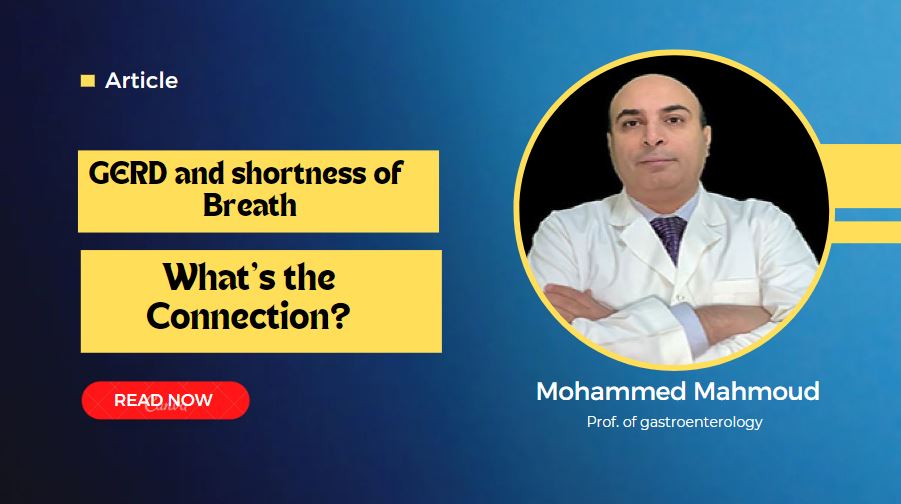Understanding Shortness of Breath From GERD
Shortness of breath is a common symptom of GERD or
Gastroesophageal Reflux Disease. If you're experiencing difficulty breathing
after eating or while lying down, there are ways to manage those uncomfortable
symptoms and improve your overall quality of life. In this article, we will
discuss the signs and symptoms of GERD-related shortness of breath, possible
causes, treatments, and self-care tips.
What is gastroesophageal reflux disease (GERD)?
Acid reflux is a condition that occurs when stomach acid can
flow back into the esophagus. People with GERD experience increased episodes of
heartburn, chest pain, and shortness of breath associated with the disorder.
people with GERD are also more likely to suffer from asthma-like symptoms that
can be caused by a weakened lower esophageal sphincter (LES), which allows acid
to travel up the throat and cause irritation.
Causes of acid reflux.
Acid reflux is a common digestive disorder caused by the
improper functioning of the lower esophageal sphincter. The lower esophageal
sphincter is responsible for keeping stomach acid from entering the esophagus,
but when it fails to function properly, acid can make its way up. Common causes
of acid reflux include eating large meals, consuming fatty or fried foods,
drinking alcohol, smoking cigarettes, and stress. Eating too quickly or lying
down immediately after eating can also cause acid reflux because it gives
stomach acids more time to rise into the esophagus. Acid reflux can also be
caused by certain medications such as aspirin or ibuprofen, obesity, and
pregnancy. Although most people experience occasional heartburn due to acid
reflux, some individuals may experience frequent or severe symptoms that
require medical attention.
Symptoms of acid reflux.
Acid reflux, also known as GERD or Gastroesophageal Reflux
Disease, is a condition in which acid from the stomach flows back up into the
esophagus. acid reflux symptoms can include heartburn, regurgitation of food,
sore throat, hoarseness, and feeling like there’s a lump in your throat. In
some cases, acid reflux can cause breathing issues such as shortness of breath
or bronchial asthma. If you are experiencing any symptoms of acid reflux or
GERD it is important to contact your healthcare provider for an evaluation.
Your doctor may suggest lifestyle modifications such as eating smaller meals
more frequently or avoiding certain foods if they believe you have acid reflux
disease. If your doctor believes that the symptoms are more serious than just
occasional episodes of acid reflux occurring then they may order additional
tests to determine the severity of the issue. It is important to talk with your
doctor so they can diagnose and treat the issue properly.
Signs and Symptoms of Shortness of Breath From GERD.
Signs and symptoms of shortness of breath associated with
GERD include wheezing, a cough, chest pain, difficulty breathing, tightness in
the chest, a noticeable worsening of asthma, or a feeling like your airways are
being constricted. These symptoms should not be ignored and should be discussed
with your doctor right away.
Acid reflux and shortness of breath, what is the connection?
There are several possible causes of shortness of breath
that are associated with GERD. One cause is when the acid or other contents of
the stomach backs up into the esophagus and irritates the lining, leading to
inflammation and narrowing of the airways. Additionally, GERD can lead to vocal
cord dysfunction which can result in difficulty breathing as well. Other
possible causes of shortness of breath from GERD include chest pain caused by
spasms of the bronchi, pulmonary embolism, pleural effusion, or pulmonary
hypertension.
Shortness of breath can be a symptom of GERD, but it can also be a sign of
other conditions.
Shortness of breath can be a symptom of GERD, but it can
also be a sign of other conditions. If you experience shortness of breath, it’s
important to talk to your doctor about what could be causing it. It may be due
to GERD, which is characterized by symptoms such as chest pain, burping, heartburn,
and nausea. Other conditions that can cause shortness of breath include
ischemic heart disease, asthma, COPD (Chronic Obstructive Pulmonary Disease),
pneumonia, and bronchitis. Other less common causes include pulmonary embolism
or anemia. If you are having trouble breathing at rest or with physical
activity, see a doctor right away for further evaluation and treatment. They
will do an exam and may recommend tests such as X-rays or blood work to help
them determine the cause of your breathing difficulties.
The Relationship between GERD and Asthma.
The relationship between GERD and asthma is complex and
still not fully understood. It is believed that GERD can trigger asthma-like
symptoms and can aggravate existing asthma in people that have the condition.
Acid flow from the esophagus to the lungs, pressure changes in the chest and
abdomen, and small particles from acid reflux are thought to be potential
causes of this relationship. GERD triggers such as spicy foods, citrus fruits,
alcohol, caffeine, chocolate, and fatty foods may also be connected to asthma
symptoms. Healthcare providers need to be aware of the
connection between GERD and asthma so that they can treat both conditions
aggressively. Eating a healthy diet that is low in fat and acid may help reduce
reflux symptoms, as well as other lifestyle changes such as avoiding smoking
and wearing loose clothing. With proper treatment, it is possible to manage
both conditions effectively.
Treatment and Self-Care Tips for breathing problems from GERD.
Several treatment options can help relieve
shortness of breath caused by GERD. These include lifestyle changes, such as
avoiding triggers like carbonated drinks and large meals; medication, including
PPIs, antacids, and H2-receptor antagonists; diet modification; and surgical or
endoscopic treatments. It’s also important to take measures to reduce stress
and anxiety levels which often can exacerbate GERD symptoms. Self-care tips
include using breathing techniques, following a healthy diet, staying active
with daily exercise, and meditating to relax your mind.
How to Avoid Flare-Ups and Manage a Long-Term Plan for Relief.
To manage shortness of breath and prevent flare-ups, it’s
important to create a long-term plan. Develop an understanding of which foods
triggers your GERD symptoms, avoid large meals, and hydrate regularly. When
strain or stress is experienced daily, look for ways to relax such
as deep breathing exercises and meditation. Create healthy habit changes like
sleeping with your head elevated to reduce nighttime acid reflux and taking any
medications prescribed by your doctor.
Conclusion
If you have heartburn and shortness of breath, they may be a
relation between them, also there is a link between acid reflux and asthma,
GERD may be a cause of asthma, moreover, asthma medications may aggravate the
symptoms caused by acid reflux as it relaxes the lower esophageal sphincter, so
if you suffer from both chronic acid reflux and respiratory symptoms, you have
to consult your doctor, because there may be a relation.

